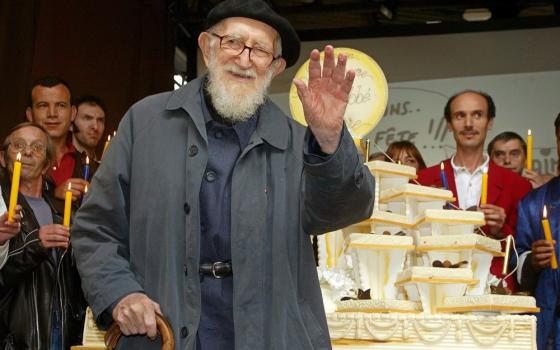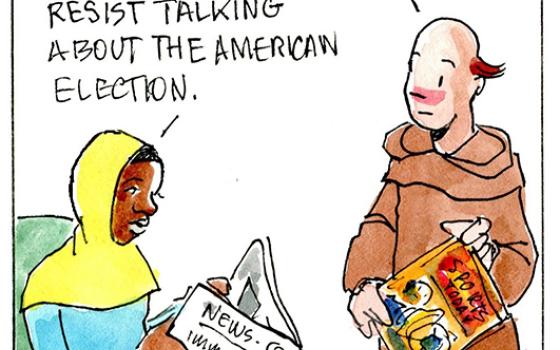|| Victim's lawyer vows to 'hold Vatican fully accountable' ||
ROME -- A Wisconsin sex abuse lawsuit against the Vatican, which helped trigger a global firestorm in early 2010, was withdrawn late Friday. It marks the formal end of a case that seemed to cast doubt on Pope Benedict XVI’s role in the abuse crisis, and shifted focus from local bishops to an alleged cover-up in Rome.
Lawyers for the victim filed a notice of voluntary dismissal on Friday, effectively abandoning the lawsuit. It had named not only the Vatican but also Pope Benedict XVI and two senior Vatican officials, Cardinals Tarcisio Bertone and Angelo Sodano, as defendants. The suit had been filed by Minnesota-based attorney Jeffrey Anderson, who has frequently represented sex abuse victims against the church.
Anderson said at the time the case was filed that he hoped to take formal depositions from Benedict XVI, Bertone and Sodano, concerning the Vatican’s role in the sex abuse crisis. Bertone is the current Secretary of State, the top official in the Vatican after the pope, a position formerly held by Sodano.
------------------------------------------------------
See also: Vatican lawyer's statement on end of sex abuse case
------------------------------------------------------
Anderson told NCR on Saturday that the decision to withdraw the case was "pragmatic and practical," based largely on the fact that as a result of proceedings related to the bankruptcy of the Milwaukee archdiocese, he had already obtained most of the files regarding the Vatican's involvement he could have gotten through a separate lawsuit. Those documents are presently under seal, he said, but he said they paint an "ugly picture" of the Vatican's role.
"We have not in any way abandoned our effort to hold the Vatican legally and fully accountable," Anderson said.
While Anderson said he does not plan to refile the Wisconsin case, he still hopes to pursue depositions of Vatican figures such as Bertone and Sodano as part of other litigation. In the meantime, he said, he plans to depose Cardinal-designate Timothy Dolan of New York, a former archbishop of Milwaukee, about his role in the Wisconsin case.
The Vatican’s lawyer, California-based Jeffrey Lena, nevertheless welcomed the withdrawal of the case.
“A case like this, which was held together by a mendacious web of claims of international conspiracy, amounts to what appears in its aftermath to have been little more than a misuse of judicial process and waste of judicial resources,” he said.
With the collapse of a similar case in Kentucky in 2010, Friday’s dismissal leaves only the Doe v. Holy See case in Oregon, originally filed in 2002, as an active sex abuse claim against the Vatican in American courts. (Another lawsuit in Chicago has been filed but not served on the Vatican through diplomatic channels.)
Anderson said that another reason for dismissing the Wisconsin case is that it allows attorneys to concentrate on the litigation in Oregon.
In terms of jurisdiction, lawyers for the Vatican argued in the Wisconsin case, as they have in others, that the Vatican is immune because it’s a sovereign state. Substantively, they contended that under church law, responsibility for supervising priests and other church personnel rests with local bishops, not in Rome.
The Wisconsin case centered on the late Fr. Lawrence Murphy, who died in 1988, and who was accused of abusing some 200 boys at the Milwaukee area St. John’s School for the Deaf between 1950 and 1974. The plaintiff in the case against the Vatican was one of those victims, whose lawyers claimed the abuse could have been prevented had the Vatican acted appropriately.
The case triggered an avalanche of negative press coverage for the Vatican and the pope in early 2010, partly because it coincided with a mushrooming series of abuse scandals in Europe. Those revelations included a 1980 case in the Munich, Germany, archdiocese, in which an abuser priest fell through the cracks on the watch of then-Cardinal Joseph Ratzinger, today Benedict XVI.
Documents filed as part of the Wisconsin lawsuit case showed that in 1996, the then-Archbishop of Milwaukee, Rembert Weakland, wrote to Ratzinger requesting action against Murphy. By that stage, Ratzinger headed the Vatican’s powerful Congregation for the Doctrine of the Faith.
Bertone, who was Ratzinger’s top deputy at the time, later counseled against a formal church trial, after Murphy wrote to the Vatican requesting clemency on the basis of age and failing health. Bertone did, however, recommend imposing “pastoral measures” on Murphy, and told Weakland the statute of limitations in church law had been waived if a trial proved necessary.
Those documents were the centerpiece of a March 24, 2010, story in the New York Times under the headline, “Vatican failed to defrock U.S. priest who abused boys.”
The story, and an accompanying editorial, drew a stinging rebuke from American Cardinal William Levada, who now holds the pope’s previous job as head of the Congregation for the Doctrine of the Faith. Levada called the coverage “deficient by any reasonable standards of fairness.”
Coupled with subsequent revelations about other American priests whose cases had also come to the attention of Rome, such as Stephen Kiesle in Oakland and Michael Teta in Tucson, the Murphy story and lawsuit helped create impressions that Ratzinger had prevented local bishops from taking aggressive action.
In the lawsuit, Anderson also cited a 1962 Vatican document called Crimen Sollicitationis. It outlined procedures for prosecuting offenses against the sacrament of penance, including sexual solicitation.
Because the document called for handling such cases confidentially, critics have touted it as a “smoking gun” proving a Vatican-orchestrated cover-up. The Vatican, however, has said the document applied only to the church’s internal discipline, and did not address the question of reporting such cases to police and prosecutors.
Defenders of the pope also argue that in cases such as Murphy’s, the issue before the Vatican was not whether abuse should be tolerated, but whether the offending priest should be laicized in addition to permanent removal from ministry. Any perceived delays, they say, occurred because those requests came at a time when the Vatican was reviewing its policies on laicization.
They contend that Ratzinger backed new anti-abuse policies in 2001 and again in 2003, and has supported them as pope.
On Jan. 31, Judge Rudolph Randa in Wisconsin denied a request from Anderson to be granted extra time to respond to the Vatican’s motions to dismiss the case, filed both on the grounds of jurisdiction and because they charged the plaintiffs had failed to state an adequate legal claim.




